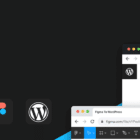In what began as a heated conversation on Twitter, Automattic CEO Matt Mullenweg and Ruby on Rails creator and Basecamp co-founder David Heinemeier Hansson took to the airwaves to debate opposing viewpoints on market share, monopolies, and power in open source communities. Hansson reacted to a statement Mullenweg made in an interview after Salesforce Ventures invested $300 million in Automattic last month.
“I think there’s potential to get to a similar market share as Android, which I believe now has 85% of all handsets,” Mullenweg told TechCrunch. “When you think about it, open source has a virtuous cycle of adoption, people building on the platform and more adoption.”
Hansson reacted on Twitter, sparking a conversation that received 116 comments.
“‘We want every website, whether it’s e-commerce or anything to be powered by WordPress’ is a nasty, monopolistic goal,” he said. “Listening to Matt muse about 85% marketshare dreams is a real downer. But $300m is a down payment on monopoly dreams.”
“We want every website, whether it’s e-commerce or anything to be powered by WordPress” is a nasty, monopolistic goal. Listening to Matt muse about 85% marketshare dreams is a real downer. But $300m is a down payment on monopoly dreams. https://t.co/hf4HShISug
— DHH (@dhh) September 19, 2019
https://platform.twitter.com/widgets.js
In an episode titled “Open Source and Power,” Mullwenweg joined Hansson on the Rework podcast for a more in-depth discussion that dives deeper into Mullenweg’s remarks on WordPress’ potential market share.
Hansson contends that he would like to see a very large, rich ecosystem of providers of tools and services on the web and expressed concern about WordPress growing many times faster than any of its competitors.
Mullenweg countered that unique domains are not the only measure of a monopoly. He also referenced Shopify as having a thriving business with a small percentage of the e-commerce platform market share.
“Even though open source can become a bit of a standard, it doesn’t prevent others from starting on it,” Mullenweg said. “The truth is if I had an evil hat on – let’s say I started doing evil monopoly stuff, people could easily fork the software – and they would. There’s a checks and balances there.”
This is a classic power dynamic in BDFL-led open source projects where the potential for a fork checks the project leader’s actions.
Hansson challenges Mullenweg’s assertion that a fork would be a threat to the project, arguing that this power is illusionary when a project has become as dominant as WordPress:
Technically someone could fork Ruby on Rails tomorrow. What is the likelihood that fork is going to succeed? Once you have this juggernaut of network effects, WordPress is growing so much faster than anyone else, the gravitational pull is huge. Should someone fork it, introducing incompatibilities, what is the likelihood that is going to be a serious contender? From me, my assessment is extremely low, just the same as if someone was to fork Ruby on Rails today and call it Snoopy on Pails. The odds of that being anything other than a curiosity for two days on Hacker News is extremely low.
The notion of Snoopy on Pails injected a bit of humor into the debate that remained high intensity for the hour-long discussion, but it also illustrated Hansson’s point regarding the absurdity of any kind of WordPress fork becoming a real threat to the project’s momentum.
it was a privilege to have @photomatt come on @reworkpodcast and debate @dhh on tech monopolies and power dynamics in open source: https://t.co/Aewq4QTwFe. Also thanks to @AdamStddrd for making this graphic that will make sense if you listen to the episode
pic.twitter.com/4cqZpX2uJk
— Wailin Wong (@VelocityWong) October 1, 2019
https://platform.twitter.com/widgets.js
“Open source can provide a veil over true power and who has that power, and I would argue that WordPress being in the position that it is, a third of all sites, is tremendous power,” Hansson said. “Even if that power is somewhat distributed, it’s still very much so located mostly with the company backing that engine and that you built a commercial business on top of it that even uses the name, goes even further to say there’s a lot of power here.
“Why would venture capitalists invest half a billion dollars into WordPress if they didn’t see Automattic as a company as having a lot of power over WordPress? The whole reason someone is able to raise that kind of money is off the back of someone who can pitch: ‘We have over a third of all websites on the internet and we think we can get to 85%.’ That’s a very compelling venture story.”
Mullenweg counters that if a Rails fork couldn’t attract a lot of users, that speaks to the Hansson’s stewardship of the project. He said that a typical WordPress release has 400-500 contributors with an estimated 10% from Automattic.
“If 200 of those went someplace else because I did something really brain dead, that would be a pretty serious competitor, and there are some examples of that in open source history,” Mullenweg said. He contended that forks with enough weight behind them can become very interesting. On this point the two project leaders remained at odds.
How Open Source Market Dominance Impacts Diversity of Tools and Services on the Web
One of Hansson’s chief concerns with WordPress reaching 85% market share is what he described as the “death of diversity.” He perceives this pursuit of increased adoption as growing open source in monopolistic ways.
“We’re living through an era right now where a small handful of big tech companies are exerting a completely undue amount of power over the internet, over discourse, over all sorts of things, and that’s something we should try to recoil from and at least learn from, not aspire to building more of,” Hansson said. “That’s what got this going – why isn’t WordPress in a great place only being a third of all the sites of the internet. Why does it need to get to 85%? Why does its growth need to be that explosive and that wild?”
This is a question many in the WordPress community have asked in the past. Does the mission of democratizing publishing necessitate such a zealous drive towards market dominance?
“I don’t want to see this concentration of power in one engine, no matter how good it is,” Hansson said.
It is at this juncture that Mullenweg revealed more of his vision for WordPress becoming the “operating system of the web,” an idea he has floated several times over the past few years.
“You have referred to WordPress a lot of times as blogging,” Mullenweg said. “I think of it more like a platform. If you look at how a lot of people are building on it, they use WordPress to bootstrap something that doesn’t look like WordPress at all. It might not even have a website. It might be powering just an API. It might be a headless or decoupled installation. It could be a store.”
He likened the idea to Apache and nginx having a dominant market share (55% and 23% respectively) in the server space.
“That doesn’t prevent the different types of websites that are built on it,” Mullenweg said. “If nginx got to 80 or 85%, that wouldn’t prevent the diversity or what people could put on their websites. WordPress could get to 85% and it wouldn’t mean that there’s any sort of monoculture or lack of diversity. If anything, it would allow people to focus more on what’s different and not recreating the WYSIWYG, the user system, the login, all that stuff we have all built a million times and you just don’t need to anymore, if something like WordPress solves your needs.”
Hansson asked what it would look like if 85% of the web ran on WordPress, a question that the community behind the project hasn’t deeply examined yet. He encouraged listeners to consider what they want the internet to look like in the future:
What is the future I’d like to live in? What does a healthy, open, free internet look like? To me it looks like an internet with tons of different providers, tons of different tools, and what we collaborate around is protocols, not consolidation of software market share, that gives individuals and companies or even projects outsized power to dictate the matters of the internet.
Matt clarified that his comments on an 85% market share are not a goal, but rather a “trailing indicator” in the quest to create the best possible experience for developers and users. A growing market share is a signal of adoption in that sense, not a goal in itself.
WordPress Community Reactions to the Debate
After the initial exchange on Twitter, the broader tech community seemed delighted to hear Mullenweg and Hansson square off in a civil debate on topics that affect so many people working on the web. The conversation touched on a lot of the friction points in the WordPress ecosystem with Automattic being one of the most powerful companies driving WordPress’ market share. Many listeners were grateful for answers to questions they have had for years.
Not sure @dhh realizes it, but he spoke for hundreds if not thousands of WordPress community members that have had similar questions for @photomatt spanning the last few years. Most aren’t afforded the same opportunity or carry the same clout to have it. https://t.co/z7wSIGJKAZ
— Matt Medeiros (@mattmedeiros) October 2, 2019
https://platform.twitter.com/widgets.js
However, the idea of WordPress as web infrastructure and the level of market dominance (85%) discussed in the podcast are controversial and even off-putting for some who are deeply invested in the platform.
“Matt appears to think of WordPress as infrastructure for the web, in the same way that Google and Facebook think of themselves as infrastructure for the web,” Morten Rand-Hendriksen said.
“In the conversation about the dangers of market control, monopolization, and monoculture, Matt says, ‘We are not a grain, we are the soil.’ The only way to interpret that from my position is ‘WordPress is not a thing on the web. It is the web,’ i.e. infrastructure. A future where WP is web infrastructure is something I think very few people actually want, open source or not.”
On the podcast, Mullenweg argued that open source allows for competition in a way proprietary software does not, but Rand-Hendriksen said he sees this as a logical fallacy.
“He talks at the same time about WP being infrastructure and powering 85% of the web AND about this being a reason for others to fight it with other solutions,” he said. “So monopolization leads to competition somehow. I don’t think WordPress is infrastructure, or that it should power 85% of the web, especially after hearing this conversation.
“If we truly believe in this idea of open source as diversification and forking, WP should actively support other projects and try to not be the dominant force on the web. WP is not infrastructure, it is very much a grain that has become a monoculture.”
Matt Medeiros, host of the Matt Report podcast focused on WordPress business and entrepreneurs, said that while the conversation answered a lot of questions, it left him wanting more.
“The cloud of uncertainty that hangs above a large portion of this community is directly formed from lack of clear communication in both WordPress.org and how Automattic + Jetpack move in lockstep with the open source project,” Medeiros said. “As we see hundreds of millions of dollars invested, with billions of dollars of valuation going to a single company, surely the optics leave one wondering how all of this gets repaid to investors?”
Automattic invariably comes under more public scrutiny regarding its investments due to having the WordPress project lead as its CEO. One interesting observation Mullenweg made during podcast is that Automattic is just one of many larger players that make up the the WordPress economy, which he has previously estimated at $10 billion/year.
“Automattic makes probably 2-3% of the revenue in the WordPress world,” Mullenweg said. “There are companies like GoDaddy, which might not contribute very much back to core, but probably have 3 or 4 times the number of subscribers than us running WordPress. I think about that a lot. I want to grow the whole ecosystem, not just our slice of it.”
Revenue is not always equal to influence, and a good portion of the end of the podcast tackled questions about power and leadership in open source.
“David’s questions are spun from the threads that fear monopoly on the web, as much as we fear a singular rule of decision making in the open source project,” Medeiros said. “I think David did well at challenging Matt’s view on the desire of world domination and how undesirable it is to earn the title of Benevolent Dictator — but it left me wanting more. For example, in an attempt to throw a curveball, Matt pointed out, the investment is made in Automattic — not WordPress — a point so opaque it didn’t fool David, but didn’t have him pressing any deeper.
“Had David viewed this conversation through the lens of our community, he would know that Automattic and WordPress.com enjoy the full benefit of leveraging the WordPress brand, a brand protected by a foundation that Matt himself founded, which may have guided the podcast episode into the ethics of it all.”
While Mullenweg’s claim that “WordPress belongs to you as much as it belongs to anyone else” is true in the sense that the software is freely available to be used and modified by anyone, the full power of leveraging the WordPress brand does not belong to everyone.
“I don’t think Matt would have been willing to have this kind of conversation with me or most members from the the general community, so I’m glad someone of David’s clout was able to engage here,” Medeiros said. “I do sympathize with all that Matt is responsible for and it’s not a challenge I think I’d be up for, given the opportunity. I love this community and want to see people stay, contribute, and flourish — not walk away because they felt unheard. DHH isn’t the hero we asked for, but he’s the hero we need right now. Hopefully he continues to keep a watchful eye over where WordPress is heading.”
If you only listen to one podcast this week, Hansson’s conversation with Mullenweg is an invigorating battle of opposing open source ideals held as a respectful exchange. In defending their positions, both reveal how their experiences of the early days of the web shaped their ideologies and approaches to open source project leadership and commercialization. Conversations like these are rare but long overdue, as the WordPress community considers its growing influence on the future of the web.




